Dive Brief:
- John Kerry plans to leave his White House post as the U.S. special presidential envoy for climate before the spring, he confirmed in a Bloomberg TV interview Wednesday. The former Secretary of State is expected to shift his focus to President Joe Biden’s reelection campaign.
- Kerry will leave the cabinet-level role created for him after three years to focus on an election season that kicked into swing Monday, as former President Donald Trump rolled to an expected win at the Iowa caucuses. Kerry’s successor hasn’t yet been named, but Biden will need Senate confirmation to fill the role.
- As the nation’s only ever climate envoy, Kerry established the post’s credentials by rejoining the Paris Climate Accords, initiating a working relationship with China on climate and supporting COP28’s nonbinding agreement by global governments to transition away from fossil fuels.
Dive Insight:
The nation’s top climate change diplomat said he felt the time was right to step away from his administration role after the COP28 agreement, but still plans to work on climate change by pushing for more private sector climate work, he told Agence France Presse Wednesday at the World Economic Forum in Davos, Switzerland.
Kerry believes this year’s best outcome for progress on climate change would be Biden’s reelection in the fall, according to Axios, who first reported his impending departure. The climate negotiator is expected to focus on pitching Biden’s climate change resume to voters as part of his reelection campaign, per reports. In the meantime, he’s “not yet out of the job of climate envoy,” Kerry told Bloomberg in Davos.
Kerry called 2023 “the single most disruptive year” in history in terms of measurable climate impacts, and said Wednesday, “There's only one cause of this crisis, it's the unmitigated burning of fossil fuel.”
Biden announced Kerry’s appointment in November 2020 as a member of his National Security Council. Having to quickly repair the damage done to the U.S. reputation on climate change under the Trump administration, Kerry helped the nation rejoin the climate treaty he helped negotiate in 2015 before using the role as a platform to get global governments to commit to do more on climate change.
Kerry is credited with the thawing of the U.S. and China’s relationship on climate change, having established a close relationship with Xie Zhenhua, his counterpart in the Chinese government. Zhenhua, who came out of retirement when Kerry’s post was created, recently announced he was retiring, again, following COP28’s agreement.
Kerry’s lasting legacy as climate envoy could hinge on the follow-through from global governments on their COP28 agreement. His continued role in the climate arena positions him to gain additional insight and influence on the private sector’s attempts to supplement government action.
While policymakers have yet to roll out how they plan to achieve those goals, the climate financing market has turned its eyes to funding the infrastructure needed for that transition. BlackRock made a $12.5 billion bet on the growth of the sector last week, and cited growing global decarbonization as a reason it acquired Global Infrastructure Partners.
Kerry told Bloomberg the nation is already seeing a movement of the biggest companies financing the transition, from automakers producing electric vehicles, to enhanced renewable energy generation and more sustainable industrial production.
“This is a transition, it doesn't have to happen overnight,” he said. “These companies have all spent billions of dollars retooling their plants. Whoever the president of the United States is, or a public official is, those CEOs are not going to suddenly go back.”












